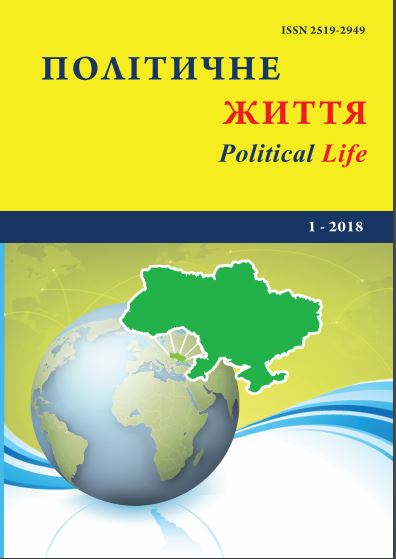Ethnoevolutionary and ethnotransformational influence of ethnopolitical disintegration: international and national political and legal mechanisms of counteraction (on the example of India).
DOI:
https://doi.org/10.31558/2519-2949.2018.1.26Keywords:
ethnopolitical disintegration/integration, indigenous peoples, scheduled tribesAbstract
While studying disintegration tendencies in Northeast India (the armed struggle of the peoples of Bodo, Kuki-chin) the processes of ethnopolitical integration and disintegration were identified rater as ethnotransformational than as ethnoevolutionary because they affect whole ethnic groups, not only their components, cause the changes in the ethnicity of the whole ethnos and are accompanied by reviewing the borders of the states in which these ethnic groups reside. At the same time, they contain signs of the ethnoevolutionary process – they cause changes in some components or parameters of an ethnic group (language, culture, consciousness, ethno-cultural environment). An example of an analysis of the ethnonational situation in South-East India demonstrates the mixed ethnoevolutionary and ethnotransformational effects of disintegration.
A comparative analysis of the essence and political and legal content of the national instrument of the scheduled tribes in India and the international legal mechanism for the protection of the rights of autochthonous ethnic groups – indigenous peoples is fulfilled. The similarity of the status of adivasi and indigenous peoples has been established, their common and distinctive features have been studied. Both are called upon to contribute to the preservation and protection of "positively discriminating" ethnic groups that are in a more vulnerable socio-economic, cultural situation due to their dependence on the traditional way of life. India has not sighned the ILO No. 169 Indigenous and Tribal Peoples Convention, instead created its own mechanism of scheduled tribes aimed to counteract the ethnopolitical disintegration of the country and to neutralize the separatist demands of radical ethnic groups for the withdrawal from the state.
References
Антонюк О. Етнічні процеси /Політологічний словник. URL: http://subject.com.ua/political/dict/504.html.
Haokip T. Political Integration of Northeast India: A Historical Analysis // Strategic Analysis. 2012. Vol. 36. № 2. Р. 304-314.
Кашин В. П. Индия: корни регионального сепаратизма // Азия и Африка сегодня. 2010. № 7. С. 28-35.
Стойко. Сепаратизм як політико-правовий феномен сучасності // Політико-правові механізми запобігання сепаратизму в демократичному суспільстві. Київ: Ін-т держави і права ім. В.М. Корецького НАН України, 2014. С. 6-22.
Zou T. Emergent Micro-National Communities: The Logic of Kuki-Chin Armed Struggle in Manipur // Strategic Analysis. 2012. Vol. 36. №2. Р. 315-327.
Haokip T. The Kukis of Northeast India: Politics and Culture. Bookwell, 2013. С. 50-64.
Census of India 2011: Scheduled castes and scheduled tribes / Office of the Registrar General & Census Commissioner, Government of India. URL: http://censusindia.gov.in/2011-Common/CensusData2011.html.
Конвенція МОП «Про корінні народи, які ведуть племінний спосіб життя в незалежних країнах» № 169 URL: http://zakon2.rada.gov.ua/laws/show/993_188.
Deepak A., Anshu Sh. Indigenous Herbal Medicines: Tribal Formulations and Traditional Herbal Practices. Jaipur- India: Aavishkar Publishers Distributor. 440 р.
Вітман К. М. Кримські татари – національна меншина чи корінний народ? // Держава і право. 2009. Вип. 45. С. 563-571.
Ratifications of C169 – Indigenous and Tribal Peoples Convention, 1989 (No. 169) / International Labor Organization. URL: http://www.ilo.org/dyn/normlex/en/f?p=NORMLEXPUB:11300:0::NO::P11300_INSTRUMENT_ID:312314.
Вітман К. М. Міжнародна законодавча база з захисту прав корінних народів: Конвенція про корінні народи і народи, що ведуть племінний спосіб життя // Вісник Державної академі керівних кадрів культури і мистецтв. 2009. № 3. С.127-131.
Walker L., Andzengе D. Nigerian Unity: Integrative Processes and Problems // Journal of Developing Societies. 1989. Vol. 5. Р. 218 – 235.

